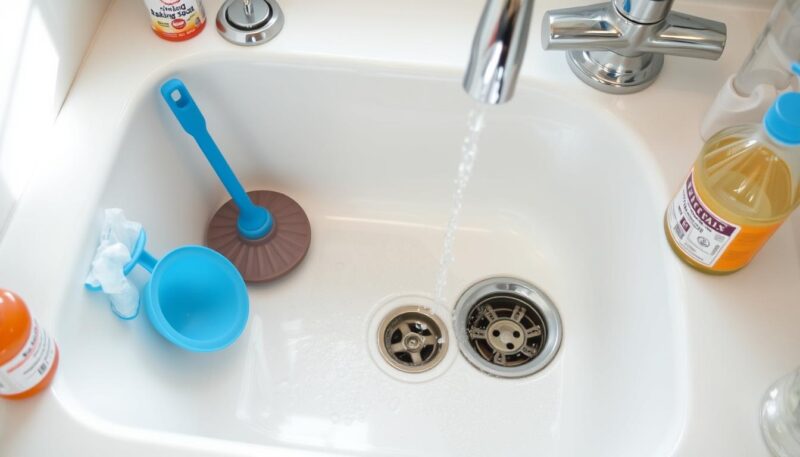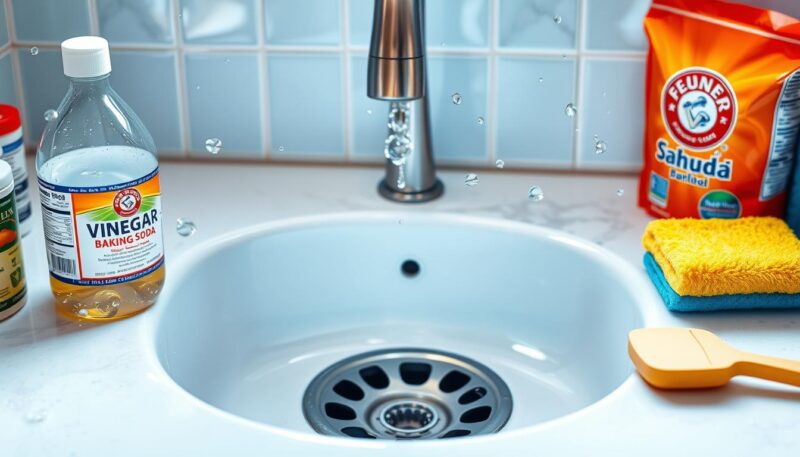Maintaining a clean kitchen sink drain is essential for preventing clogs and ensuring a steady flow of water. With time, food waste, grease, and soap can build up in your pipes, creating unsanitary conditions and undesirable odors. Yet, many overlook the importance of routine maintenance for their sinks. In this article, you will uncover easy sink unclogging solutions through DIY techniques and natural household ingredients that keep your kitchen sink drain in top shape.
Did you know that using a simple 1:2 ratio of baking soda to white vinegar can be a game changer for cleaning kitchen sink drains? Letting the mixture sit for 15 minutes enhances its effectiveness. By applying these kitchen drain cleaning tips, you not only maintain hygiene but also prolong the lifespan of your plumbing system, avoiding expensive plumbing emergencies in the future. Keep your kitchen fresh and functional with just a bit of effort, and your sinks will thank you for it!
Understanding the Importance of Cleaning Your Kitchen Sink Drain
Maintaining kitchen drains is crucial for the overall hygiene and efficiency of your cooking area. Regular kitchen sink care helps prevent clogs and ensures a pleasant cooking environment. Knowing why it is essential to clean your kitchen sink drains can save you from unpleasant surprises down the line. Understanding the common causes of clogs is the first step toward effective maintenance.
Why Regular Maintenance is Essential
Regular cleaning of kitchen sink drains minimizes the chances of blockages, which in turn improves plumbing system efficiency. Neglected drains can accumulate debris and food particles, leading to unpleasant odors and inviting bacteria growth. Cleaning your drains helps avoid issues such as corrosion, leaks, or even pipe bursts that can lead to costly repairs and water damage. Additionally, a clean and well-maintained drain enhances water flow, significantly improving drainage system performance. This means you can enjoy a more efficient cooking space without wasting time dealing with slow drains.
Common Causes of Clogs
Identifying the common causes of clogs can guide your maintenance efforts. Frequent culprits include:
- Food debris: Small food items can easily get stuck and accumulate in your pipes.
- Grease buildup: Pouring grease down the drain is a leading cause of kitchen clogs.
- Soap scum: Residues from soaps and detergents can form blockages.
- Foreign objects: Items that accidentally fall into the sink can lead to significant blockages.
Taking preventative measures to tackle these issues early is crucial to maintaining the clarity of your kitchen sink drain and preventing future complications.
Cleaning Kitchen Sink Drain – Effective Methods You Can Try
When it comes to maintaining a clean kitchen sink drain, you have a variety of options that are both simple and effective. With just 20 minutes of your time, you can implement various methods that do not require harsh chemicals. Tackling the task of removing clogs from sink drains can be done with items you may already have in your kitchen.
DIY Solutions for Clear Pipes
One of the most popular and effective methods for cleaning drains involves using baking soda and vinegar. This combination produces a bubbly reaction that works to dissolve buildup and grime within your pipes. Not only is it an economical choice, but it is also environmentally friendly. For those seeking additional DIY methods, consider using a drain snake every three to six months to break up greasy clogs and debris.
How to Use Dish Soap and Hot Water
Using dish soap combined with hot water is another fantastic approach when clearing pipes DIY. Begin by boiling water, then mix in a few tablespoons of dish soap before pouring it down your drain. This mixture helps cut through grease and food particles efficiently. Aim to incorporate this method into your monthly maintenance routine to prevent any odors or bacteria from accumulating.
Using Salt for Extra Scrubbing Power
Salt can provide an extra scrubbing power when dealing with stubborn clogs caused by fat or soap scum. Pour a generous amount of salt down the drain, followed by boiling water. This technique employs salt’s abrasive nature to help breakup debris, proving to be one of the effective methods for cleaning drains. Keep in mind that regular drain maintenance can significantly reduce the chances of future clogs.

| Method | Time Required | Frequency Recommended | Effectiveness |
|---|---|---|---|
| Baking Soda & Vinegar | 5 mins | Monthly | High |
| Dish Soap & Hot Water | 10 mins | Monthly | Moderate to High |
| Salt & Boiling Water | 5 mins | As needed | High |
| Drain Snake | 15 mins | Every 3-6 months | Very High |
Implementing these methods will not only help in removing clogs from your sink but also create a healthier environment in your kitchen. Maintaining your sink drain ensures a fresher, cleaner home while avoiding costly plumbing issues down the road.
Conclusion
Maintaining a clean kitchen sink drain is not just about aesthetics; it’s crucial for ensuring a healthy and functional kitchen environment. With the right kitchen sink maintenance routine, you can keep clogs and unpleasant odors at bay. As highlighted, the simple solutions for clear drains—like using baking soda and vinegar, dish soap with hot water, and salt—offer effective and safe ways to prevent buildup in your plumbing.
Incorporating regular cleaning habits into your routine, such as rinsing thoroughly after each use and employing a sink strainer, can significantly prolong the life of your kitchen sink drain. Additionally, dealing with common issues through proactive measures, like using a plunger or checking for leaks, helps maintain optimal performance and prevents emergency situations.
Ultimately, investing a little time in kitchen sink maintenance pays off by ensuring your kitchen remains hygienic and efficient. Don’t wait for a clog to disrupt your daily life; embrace these simple cleaning solutions today and enjoy a hassle-free kitchen experience for years to come.

